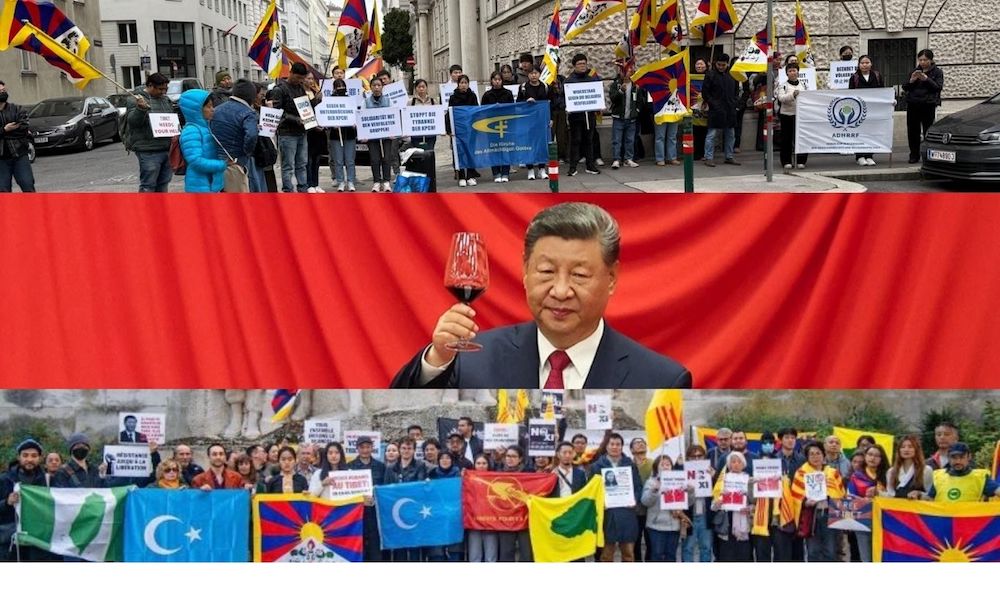By Tenzin Sampho
Around the globe thousands of Tibetan exiles went to the polling stations to cast their votes for the Kalon Tripa post. Participation in this election process was widely advertised by many and encouraged particularly by the masses themselves. Tibetans young and old saw this election as a turning phase in the chapter of Tibetan history, each endorsing their own candidates, some even fiercely defending them during friendly debates, on different forums and on social networking sites. Hundreds flocked to see the candidates debating at different venues, thousands more tuned in to watch it online.
On Sunday October 3rd polling booths across the world opened for the preliminary election. Polling stations also opened in Nepal at the same time, but an hour before closing, armed Nepalese policemen came to the polling station and seized all the ballot boxes. Thousands of ballots lay in those boxes along with the hopes of those Tibetans that wanted a say in their country’s future. Hours after the incident took place, I saw the video of the Nepalese policemen taking our ballots away and the few Tibetans looking helplessly, many of them confused as to what just took place. I read somewhere that some of the Amala’s were in tears after discovering what had happened and I am certain many young people were enraged. No matter the different emotions we felt at the time, one thing was certain; we all felt helpless.
In my theory the timing of the seizure of ballots was carefully planned by the Nepalese Home Ministry. Perhaps, they were instructed to wait until the last minute in order to collect personal information from the ballots and use that information to track all politically active Tibetans living in Nepal. I say this because in Afghanistan, a similar strategy was being used by the insurgents that were against the coalition led elections, during those elections they would let villagers cast their ballots without any interference and then around closing time they would steal the ballot boxes. Voila! Now, they had a hit list in their hands. This tactic ensured that the next time when security was stepped up and coalition soldiers were supervising the elections no one would dare go to the polls because threats had already been sent to all who voted in the prior election and were being watched closely. To the Afghan government and the coalition forces it would seem that there was not enough public interest in the elections which was far from the truth.
My own experience with the “vote by proxy” law started about a month before the primary elections when I put in a request to have my father vote on my behalf at the local Tibetan Association, I had some traveling to do which prevented me from voting that day, but two weeks prior to the election day I was told by the local Tibetan association that my request to vote by proxy was denied by the Office of Tibet in New York. I made some inquiries and discovered that it was true that a vote by proxy was not allowed in the Tibetan election rule book. I got hold of a copy of the rule book and started reading it, wondering how the physically disabled Tibetans voted. I was surprised to find that physically disabled Tibetans who didn’t have anyone to take them to the polls and exiles living in remote parts of the world could not participate in our election because there was no rule in place that enabled them to do so.
The idea of vote by proxy is not something new. It dates back to the Roman Emperor Augustus, the first to introduce and make use of this idea, making it possible for senators in far away colonies to cast votes for city offices in Rome by sending messengers with the name of the candidates in sealed letters. In the United States, Wisconsin became the first of a number of U.S states which enacted provisions to allow absentee voting by soldiers fighting in the Union army during the Civil War. Its neighbor Canada in 1915 agreed on letting active military personnel to vote by post during World War I and in 1916, the Canadian province of British Colombia followed suit. Canada introduced proxy law in 1955 to allow relatives of the prisoners of war to vote on behalf of the prisoners, later on this right was extended to all citizens. Going across the Atlantic, United Kingdom has the perfect example of external voting where there are three ways to vote; you can vote in person, you can have someone vote on your behalf and you can vote by post. It is a simple process that encourages potential voters to participate in the elections, it also allows voters that cannot go to a polling station to vote or anyone living abroad to participate in their home elections. There are many other countries like Switzerland, Germany, United States, France, Norway, New Zealand and Australia that have some sort of a vote by proxy rule in place and they each have different reasons for adopting the vote by proxy law. I cannot help but imagine that the incident in Nepal is our call to introduce a vote by proxy law to the electoral process.
If a vote by proxy rule is adopted it will do three things;
First and foremost the Tibetans in Nepal will have a chance to vote by post or by relatives living in India. Future elections can be conducted this way if Nepal continues to remain a pawn of the Chinese government.
Secondly, similar incidents like the recent one in Nepal could be avoided in the future, providing a protective blanket to the entire electoral process. I say this because looking into the future there is also a possibility, however small, that India after his holiness’s passing away could succumb under Chinese pressure to interfere with future elections within the Tibetan exiled community. In such an event, vote by post or proxy could save us a costly conflict with India. We would all like to think that the government of India would never resort to such injustice, but the fact remains that political decisions are blind to the disadvantaged. Just tune in to any news station and recount the misfortune, inequity and promises not kept, it constitutes an epidemic inflicting us in the 21st century. Keeping this in mind the inclusion of such a rule would be pivotal in this case.
Lastly, there are hundreds of Tibetan’s who cannot go to a polling station to vote because of their physical disability and there are hundreds more that cannot vote because they live in remote parts of the world. Those Tibetan citizens who cannot physically be present at a polling station no matter the reason will be able to have a voice in the electoral process if such a rule is adopted. It will also increase voter turnout that everyone is hoping for.
In the end, all Tibetan citizens have the right to a voice in choosing their Prime Minister, and to take that away from them is a human rights violation. We may not be able to sway Nepal’s policy in our favor, but we can certainly take the initiative and explore other ways to protect and to keep our newly formed democracy functioning. To understand the entire election process or to propose a final solution is not what I intended to do here, rather it is an effort to create awareness within our community of the possible issues facing us and possible alternatives that best represent us.
The writer is a Tibetan resident of Boston, MA, United States.
[OPINION-DISCLAIMER]









